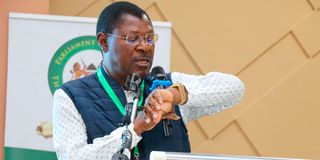Only President Ruto will decide direction of Kenya's foreign policy - Wetang’ula

Speaker of the National Assembly Moses Wetangula looks at his wristwatch after he officially launched the mid-term three-day retreat for Members of the National Assembly on January 28, 2025 at Lake Naivasha Resort in Nakuru County.
President William Ruto will be deciding the direction the country takes on foreign policy matters, according to Speaker of the National Assembly Moses Wetang’ula.
The Speaker made the assertions on Friday, ostensibly giving the President a free hand in choosing Kenya’s stands on regional and international issues, regardless of whether or not Kenyans agree. And as the people’s representatives, the MPs will debate a revised foreign policy that requires their adoption.
According to Speaker Wetang’ula, the foreign policy in the country is exclusively run at the presidential level and no other person or agency can engage in it outside the official framework.
He spoke on Friday when he hosted the Algerian Ambassador to Kenya Mahi Boumediene who paid him a courtesy call.
“The foreign policy in Kenya is directed, determined and administered by the President and the National Government,” the Speaker said, according to a dispatch released by his office on Friday.
Further, Mr Wetang’ula urged government agencies to adhere to the established policies by employing caution in their diplomatic engagements.
“Any other position or individual does not represent the official stance of the Republic of Kenya and its people,” he stated.
In fairness, the Speaker was describing what has been a tradition in Kenya. Every President chooses his priorities on foreign policy, although Kenya’s running thread has often been seeking a peaceful existence with neighbours, mediating in regional conflicts, supporting peacekeeping efforts and defending the multilateral arena.
Until 2013, Kenya didn’t have a formal foreign policy.
A 2014 policy identified five pillars which have now been expanded in a revised document to include diaspora, digital diplomacy, economic and trade issues, climate change and blue economy.
A sessional paper on Kenya’s Foreign Policy is currently before Parliament, awaiting approval.
If endorsed as was proposed, it says actors of Kenya’s foreign policy will also include citizens who may legally petition the government on certain standpoints.
Wetang’ula argued it is important Kenya’s foreign to align with global realities and leverage international connections for improved livelihoods and economic growth.
Lately however, Kenya ran into controversy.
For example, it hosted rebels from the Democratic Republic of Congo who professed intention to topple the Congolese government.
Kinshasa protested and recalled its ambassador from Nairobi. It has since refused to accredit Kenya’s new envoy.
Last week, Kenya also angered the military government in Sudan after hosting rivals Rapid Support Forces (RSF) who signed a charter with allied groups to start a parallel government.
On Friday, the Speaker said he had discussed with Algeria an upcoming parliamentary tour by Algerian legislators to Kenya. Wetang’ula had earlier visited Algiers in 2023 on a three-day trip.
The two leaders discussed several areas of interest for Kenya and Algeria including the just concluded elections for the Africa Union Chairmanship (AUC).
Wetang’ula thanked Algeria which he said had honoured its promise to support Kenya’s candidate, Raila Odinga, in the AUC elections. Djibouti’s Mahmoud Ali Youssouf won the polls, however.
Algeria’s Salma Malika Haddadi, a former envoy to Kenya won the seat of the AUC Deputy Chairperson.


